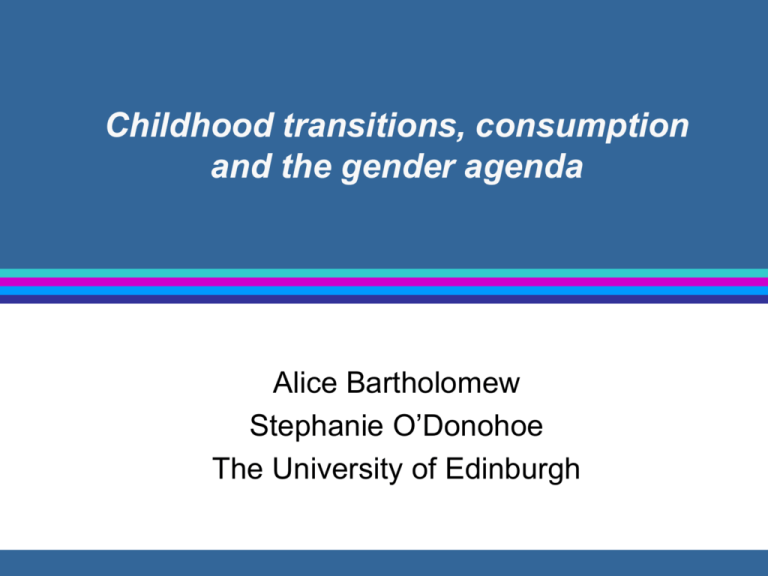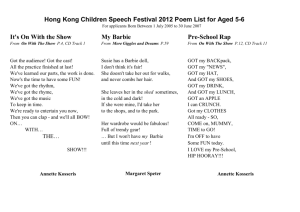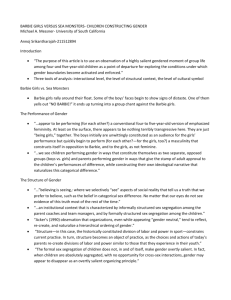The business of becoming: children, consumption and advertising in
advertisement

Childhood transitions, consumption and the gender agenda Alice Bartholomew Stephanie O’Donohoe The University of Edinburgh Outline theoretical context methodology findings conclusions Theoretical context The “waiting child” (Qvortrup 2004) being and becoming (Johansson 2004) transition vs trajectories and anticipatory socialization (Waerdahl 2005) discourse of development (Kalle 2001) gender identities in transition - “relational, multiple and processual” (Renold 2004; Cook & Kaiser 2004; Russell & Tyler 2005) Methodology Interpretive study, inspired by Mick and Buhl (1992) Aimed to offer contextualised, childcentred understanding of 10-12 year-olds’ experiences of advertising • what, if anything, did the children do with advertising (advertising literacy, uses and gratifications) • how was their sociocultural context bound up with their experiences of advertising? The embedded nature of media reception means that, in the end, we have to widen the scope of our inquiries to take in the whole gamut of texts, objects and daily activities – asking about the ongoing and intricate processes through which social subjects articulate their lived cultures. Moores (1993:10) Methodology ctd 39 Scottish 10-12 year-olds P7s and S1s in 1 private, 2 state schools (“Corby” and “Wetheral”) Friendship triads Individual photo diaries & lifeworld interviews Group discussion (with ad lists etc) Shifting selves There’s one wi’ a guy wi’ ginger hair. He keeps on complaining, like he’s just about ta turn inta a teenager and that, and he’s like “goody goody I want the computer game and that”. Waiting for 12 o’clock so he can open the present. And he ends up turning inta a teenager soon as 12 o’clock comes, and he opens his present and starts shouting “WHAT’S THIS!”. Pure going radge at the computer game, when he really wanted it when he was younger. (Boy, S1, Wetheral) I: What’s it like coming to secondary school? A. It’s like going back to Primary 1. Um, you think you’re so big in Primary 7 and you go to first year and then it’s like “Oh, down to the bottom of the school again”, so you’ve got to like work back up to sixth year. It’s quite weird – go to the top of the school, to the bottom again. (Girl, S1, Corby) At 10 or 11 at primary school you are the king of the castle. You know your role in the school. You are the influencer of toys, games, lunchbox contents and attitudes. Just one year on at secondary and you are one of the babies again. The people in the year above seem so much older and more sophisticated, and the sixth formers are unspeakably grown up. It is your turn to be influenced by others older than yourself (Hobson 1999:7) I had my rabbit when I was only seven and I didn’t really take care of it that well. I mean I used to handle it and play with it but I never ever cleaned it out. My mum always had to do that. And I never remembered to feed it or water it. I was just playing with it. And then I got my hamster and I was about ten and I just, I’ve done everything with my hamster. My mum doesn’t help. (Boy, S1, private) Boy, P7, Corby Boy, S1, Wetheral Girl, P7, private Aspirational maturity Brands as “lifeline into the future” (Waerdahl 2005): I’d been like Barbie and all that, and THEN my sister like went mental about football and I kinda joined in with her and then I got this white shirt and it had the Adidas sign and I thought that it looked quite nice. And then like my sister was going to sports shops looking at the new strips and stuff and I saw these shirts and thought “Oh it would be quite nice, they are a change from Minnie Mouse pink ones” and, I mean, OK, it was probably a PINK Adidas one that I saw at the time but it was kinda what, partly what I was BECOMING to be and partly what I WAS…. (Girl, P7, private) Looking back as well as forward: “photos from my time in Australia, they remind me of the past”. (P7 boy, Wetheral) That (teddy) I’ve had all my life.... he’s the main one really. He’s upstairs and falling apart a bit, he’s got I think it’s his right ear, it’s sort of chewed.... they just sort of mean a lot cos I’ve had them for so long. (S1 girl, private) The Barbie factor… girls returned to Barbie in spirit of self-knowing kitsch (Eden 2000) rejecting Barbie “rite of passage and a rejection of their past” (Nairn 2005) C: I don’t buy Barbies anymore. They’re all dead…. S: I torture mine. C: I hung them at Halloween. All their hair’s cut as well. They’re all GI Janes. (Girls, P7, private) Media and advertising Sporting, music and soap stars as “good role models” I just like the people that are in it, and the things that they do, and like if they’ve got problems and that, and they’re trying to sort them out…. (Girl, P7, Wetheral) Interest in ads targeted at older groups This guy phones up Direct Line... And it’s quite smart the way it looks like they’re standing right next to each other... Because it’s a white background. But then she goes “well get your builder to fix it and we’ll pay for it”. And then it separates and you see the phone line... Cos they’re friendly and it sounds like they’re just chatting to a friend. So they are kinda saying like “we are your friend”. (Boys, S1, Corby) Gendered selves Girl, P7, Corby A: [I] set up this wee torture thing. It was like my sister’s got a Barbie house ....and she’s got this wee thing on the roof. So I put a Barbie doll on a chair, then I put a bike on the roof with rope attached to the seat of the bike, then I put the other end of the rope round the Barbie doll’s neck. (Laughs). And then I rode the bike down the roof. (Laughs so much he almost chokes). P: Pull all their hairs out! A: And there goes the Barbie doll and then my sister comes in and she goes “STOP IT!”…. B: I’ve got them hanging from my roof, wee Barbie dolls going “urrrrgh” (laughs). (Boys, S1, Corby) Negotiating hegemonic masculinity Hegemonic masculinity “a crucial part of the texture of many routine mundane social and disciplinary activities” (Wetherell and Edley 1999) Kappa’s getting a bit slagged, well it was.... And anybody that wore that used to get like totally slagged… I think there was some story there, the person who made Kappa was gay or something so they all think the whole thing’s gay or something (Boy, S1, Corby) “taking the mickey out of” gay celebrities Ads and gendered identities I: OK A.’s got quite an array of health, beauty and cleanliness kind of ads. P: You need them A, you NEED them! I: OK tell me about some of those? B: Smelly boy! A: Well there’s the Le Grand Curl it was like these little eyelash things! They’re meant to curl your eyelashes (others burst out in laughter). B: Oh my God! A: It’s off Watchdog! B: You’re not supposed to be saying these things! (uses exasperated voice) (Boys, S1, Corby) B: L’Oreal adverts are the worst! W: “Caz I’m wooorth it” [imitates pathetic female voice]. No you’re not! [B. laughs]. Oh there’s this wifey and she’s pushing fifty and she’s had about 40 face lifts. And she’s advertising a wrinkle cream. But she’s got wrinkles herself! She’s like “Look how much of a good job it’s done on me” and I’m going, well no one’s gonna buy it cos you’ve got wrinkles. Wrinkles under her eyes and BAGS and round here and that. (Boys, S1, Wetheral) I: Another of the ones that came up that Linda mentioned was “Always and tampon ads”? L: Ooooh no, do not talk about that! [Laughs]…. I: So what happens when you see them then? L: I thought I hated the one where there’s all these women in bras and pants and they’re all in front of the mirror and I think it’s horrible [the leather sofa creaks as the other two slide back, visibly recoiling from the conversation]. J: I hate talking about things like this, it really gets embarrassing [all giggle] (Girls, P7, Corby) M: I like the Tampax advert…And the one where the song, I can’t remember the song. Diane, you ken the song?.... D: “Bodyform for yooooooou” [laughs wildly] .... “Bodyform for yooooooou”, I sung that in class all day once right. I wouldnae stop singing it [giggles]. And they were telling me ta “Shut up D. shut up! We’re trying ta do our work!” (Girls, S1, Wetheral) Gender relations I: So what about health and beauty ads? A: Herbal Essences, yeah! Herbal Essences. When she’s on the plane. And she goes in an’ she washes her hair on the plane and, ya can hear it on the speaker, an’ she’s suddenly going, “YEEES, YEEEES, YEEEEES” (imitates). An’ she comes out and the woman goes “I want the shampoo SHE’S using” (imitates, putting on Liverpudlian accent)... G: She was doing it today, she was in the shower and “YEES, YEEEES” A: “YEES, YEEEES”.... I was in the shower and I had my Herbal Essences. An’ the boys always, they say “have you got Herbal Essences?”, an’ they go “YEEES”. So I thought, HEY I’ve got Herbal Essences, so I was sitting there going “YEEES” and washing my hair. I: ...The boys comment on that Herbal Essences one as well? A: Yeah they think it’s a funny advert. THEY think OTHER things about it though! About what she’s saying! (Girls, S1, Corby) Girls’ interest in opposite sex often framed in terms of romance A: Well it’s just sort of cool... Like they somehow go together in a way because... J: Because if you’re scared then you can turn to him and he can sit there and go “it’s OK, it’ll be OK”. A: It just sort of goes together (Girls, P7, Corby) Ads offered scripts for communicating with opposite sex Conclusions Children’s becoming is “…performed, mediated, and negotiated against a backdrop of contemporary consumer culture” (Russell & Tyler 2005) Consumer culture - props rather than backdrop Things, media and ads allowed children to • engage in anticipatory socialisation (Waerdahl 2005) • negotiate gender identities and relationships (Renold 2004)






